The combination of property management with lease tracking and accounting under customer relationship management functions as the complex system that controls real estate processes. Hand-based processing of business operations results in inefficient management and processing problems for organizations. Real Estate ERP software resolves key challenges within the industry through its implementation.
Real Estate ERP platforms unite various business operations into a single interface so property managers join forces with investors to partner with developers through automated workflow systems that strengthen accounting functions and build better client relationships. ERP software system provides essential market understanding regarding property efficiency in addition to cash flow analysis and real estate landscape patterns to fulfil the growing demand for data-driven property decision-making platforms.
When a business selects the correct ERP system, it achieves asset optimization and compliance adherence as well as enhanced operational output in any residential, commercial, or construction sector. The document examines 17 innovative real estate ERP software programs in the market to showcase their essential features and business benefits. Real estate operations receive assistance from this guide through its service which helps users identify the ideal ERP solution between major programs SAP S/4HANA and Oracle NetSuite as well as the Indian market-specific BHOOMI software.
What is Real Estate ERP Software?
Real Estate ERP software includes all of the following elements in its definition. As Real Estate Enterprise Resource Planning technology operates, it integrates a centralized system for real estate property management alongside financial operations and lease agreement management, including customer relationship handling capabilities. The system enhances business productiveness rate,s cuts operational costs, and enables better strategic choices.
Key Features of Real Estate ERP Software
Real estate enterprises should evaluate three critical features before selecting an ERP system:
- Property Management: The organization uses this system to track property information, including lease documentation together with ownership details of all tenants.
- Financial & Accounting Tools: This system will automatically handle rent payments as well as create invoices and regulate taxation systems.
- CRM (Customer Relationship Management): The system enhances contacts with purchasing clients, rental tenants, and investment stakeholders.
- Workflow Automation: Background operations become automated for lease renewals and maintenance requests, as well as reporting.
- Compliance & Legal Management: The system protects the organization from non-compliance with required industry standards and lease specifications.
Tips for Choosing the Best Real Estate ERP Software
Choosing an appropriate Real Estate ERP software creates a critical strategic choice for business growth by positively influencing operational efficiency and profitability levels. The selection of the ideal Real Estate ERP software demands this essential list of evaluation factors for your business operations.
- Define Your Business Needs: Before choosing ERP software, determine what functions you require including property management, lease tracking, accounting, CRM and every capability. Your business type between residential and commercial development or construction or mixed-use development should be your first consideration.
- Look for Scalability and Flexibility: A suitable choice must provide capacity for future growth as your property management operations evolve from several buildings to many different buildings and properties. Protectable customization features should be present to adapt the ERP system according to your one-of-a-kind operational methods.
- Check Integration Capabilities: Your ERP system must allow smooth connections to all existing CRM together with accounting software as well as marketing solutions and document management platforms. Systems with user-friendly integration support allow users to link their software with QuickBooks, Salesforce, Microsoft 365 and payment gateways.
- Evaluate User-Friendliness and Training Support: Your business should choose an ERP system that presents an interface design that enables even non-technical employees to work easily. Many vendors supply training together with customer support and detailed documentation to their clients.
- Consider Deployment Options Cloud vs. On-Premise: To access ERP systems at any time from anywhere, companies should consider using cloud-based platforms that also reduce initial investment needs and implement automatic system updates like Oracle NetSuite and Microsoft Dynamics 365.ERP systems deployed onsite give organizations better control together with enhanced security protection yet they need more technical support and IT staffing (such as SAP Business One).
- Prioritize Security and Compliance: Make sure the ERP software complies with data security rules starting from GDPR together with real estate compliance standards. Your choice of ERP system requires assessment of features which include encrypted data storage and role-based access alongside an audit trail capability.
- Compare Pricing and Total Cost of Ownership: Make an analysis of the complete expenditure, including both initial investment and subscription fees in addition to customization expenses and support expenses. The software system enables payment structures based on customizable features which users only pay for their required functionalities.
- Customers Should Read Both Reviews and Testimonials for Their Potential IT Selection: Examine user reports and review industry-approved case studies as well as recommendations from real-life users to determine the reliability and speed potential of the software platform.
Choose ERP systems that both customers and experts rate highly in terms of support and ease of operation. ERP software selection enables improved business operations alongside superior decision processes, which result in sustained business achievement. Use your assessment time to view different options and request demos to pick a solution that fits your real estate objectives.
List of Best Real Estate ERP Software
1. SAP S/4HANA
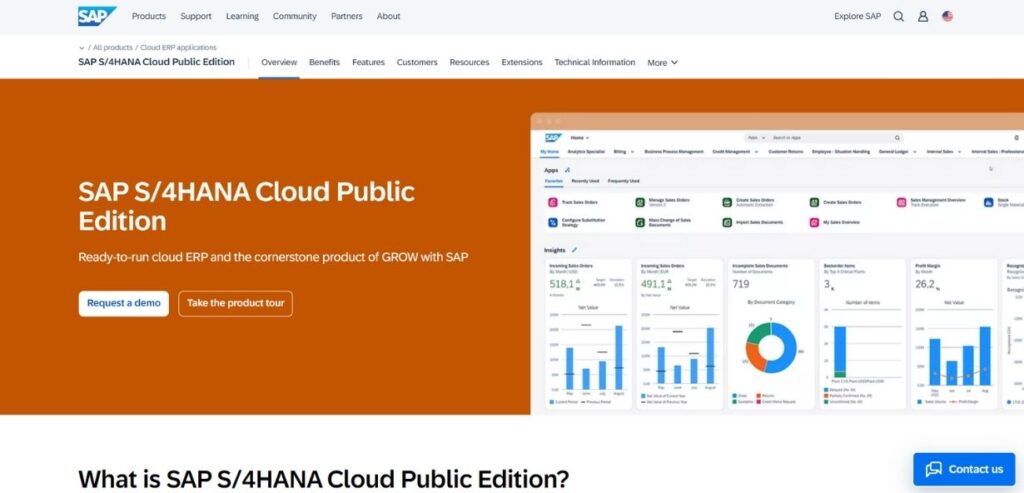
SAP S/4HANA delivers its enterprise-grade ERP solution to enhance real estate business operations. SAP S/4HANA features enable organizations to accomplish total lease administration as well as real-time financial analysis within regulatory frameworks. SAP S/4HANA delivers real-time data processing, which helps large real estate companies to make informed decisions immediately. Better operational efficiency emerges from strategic space management features of the operating system and its centralized business processes.
Key Features:
- Advanced lease management
- Real-time financial analytics
- Regulatory compliance tracking
- Asset management
- Integrated CRM
Best Use:
This system yields its highest benefits to business organizations managing extensive property portfolios because it excels at implementing financial regulations and control standards.
Integration:
The system enables users to create IP connections which link SAP modules with external third-party applications.
Pricing: The rates in the pricing system become adjusted to fit the individual requirements of each organization.
Website: www.sap.com/products/s4hana-erp.html
2. Oracle NetSuite
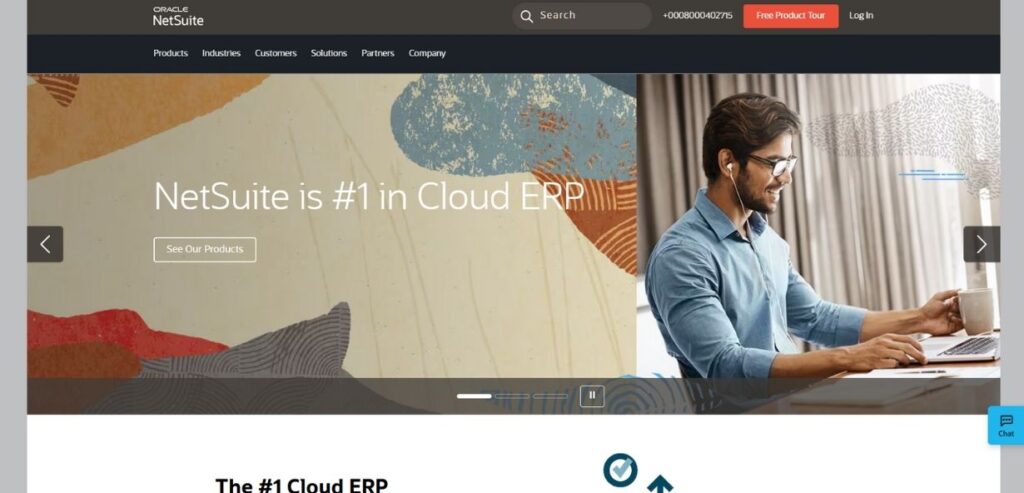
The cloud solution called Oracle NetSuite exists specifically for property managers who need financial operations management software. Oracle NetSuite combines all three components, including accounting, customer relationship management and lease tracking, to provide a single platform that boosts operational performance and improves financial clarity. Real-time financial reporting tools, along with budgeting features of the platform, assist in executive-level planning through better decision structures.
Key Features:
- Comprehensive accounting management
- Integrated CRM
- Lease and contract management
- Real-time financial reporting
- Budgeting and forecasting
Best Use:
The software matches the needs of property management firms that operate between medium and large sizes while providing their operations with cloud-based unification.
Integration:
The system features wide-ranging connectivity features that link with numerous external third-party programs.
Pricing: The platform offers pricing strategies based on organizational dimensions coupled with business specifications.
Website: www.netsuite.com/portal/in/home.shtml
3. Microsoft Dynamics 365
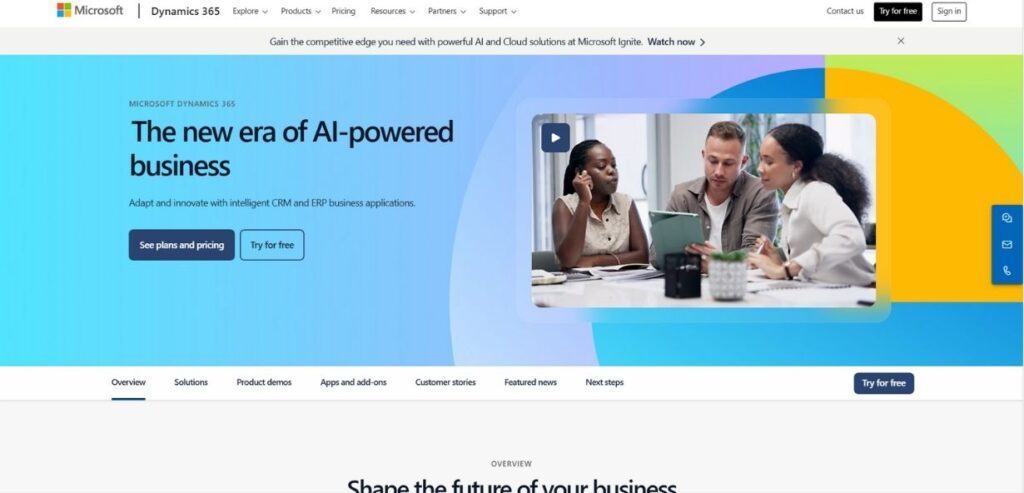
Microsoft Dynamics 365 includes specific analytic predictions alongside asset management features with tenant tracking capabilities that address real estate firm requirements. The system merges CRM and real estate ERP software solution functionalities to deliver a complete platform for managing properties. The platform delivers financial management tools that easily operate with Microsoft products to boost teamwork and productivity between users.
Key Features:
- Predictive analytics
- Asset and property management
- Tenant and lease tracking
- Financial management
- Integrated CRM
Best Use:
This tool matches organizations that need predictive analytics solutions alongside complete asset management capabilities in real estate corporations.
Integration:
It supports a smooth connection to both Microsoft applications as well as diverse outside software programs.
Pricing: The pricing system offers customized subscription deals based on company requirements.
Website: dynamics.microsoft.com/en-us/industries/real-estate/
4. Yardi Voyager
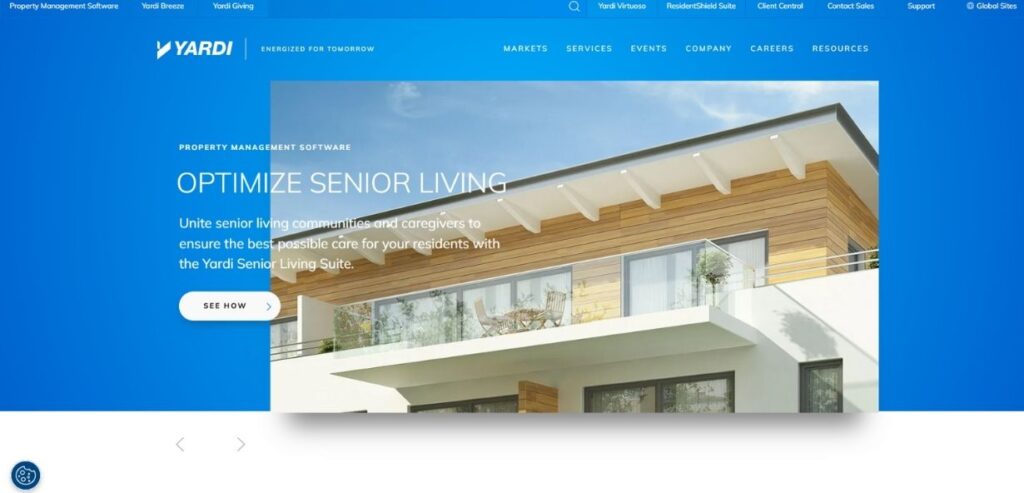
Both commercial and residential real estate properties find Yardi Voyager to be a complete solution for property management. Lease management together with accounting and maintenance tracking capabilities, operate as a complete system through Yardi Voyager. Financial planning receives support through built-in budgeting and forecasting tools available on the system.
Key Features:
- Lease and tenant management
- Property accounting
- Maintenance management
- Budgeting and forecasting
- Compliance management
Best Use:
Such software best meets the requirements of property managers who manage multiple properties through a unified management system.
Integration:
The application operates by linking with multiple Yardi modules alongside third-party program systems.
Pricing: The pricing system calculates prices by matching the portfolio dimensions and detailed requirements.
Website: www.yardi.com/products/yardi-voyager/
5. MRI Software
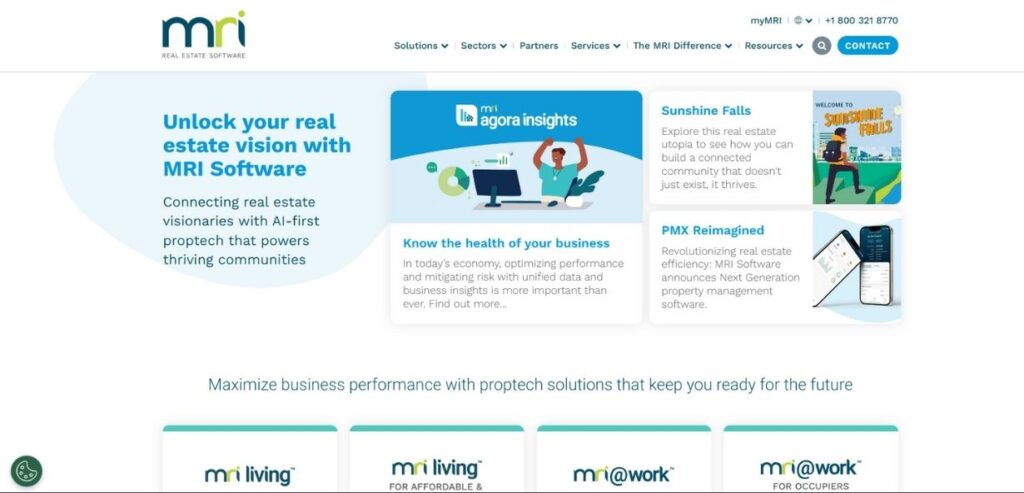
The software products of ERP Software target real estate investors together with developers through their lease administration tools and investment management capabilities. The system presents adjustable software solutions that adapt to intricate real estate operational needs. A complete property oversight solution is supported by MRI Software through its platform which includes features for property accounting in combination with facilities management.
Key Features:
- Lease administration
- Investment management
- Property accounting
- Facilities management
- Strategic planning tools
Best Use:
Complex real estate investors, along with developer,s benefit highly from this solution when overseeing multiple investments in their portfolios.
Integration:
The system enables open integration functions with different external third-party applications.
Pricing: The pricing system offers customization to satisfy the requirements of individual businesses.
Website: www.mrisoftware.com
6. Buildium
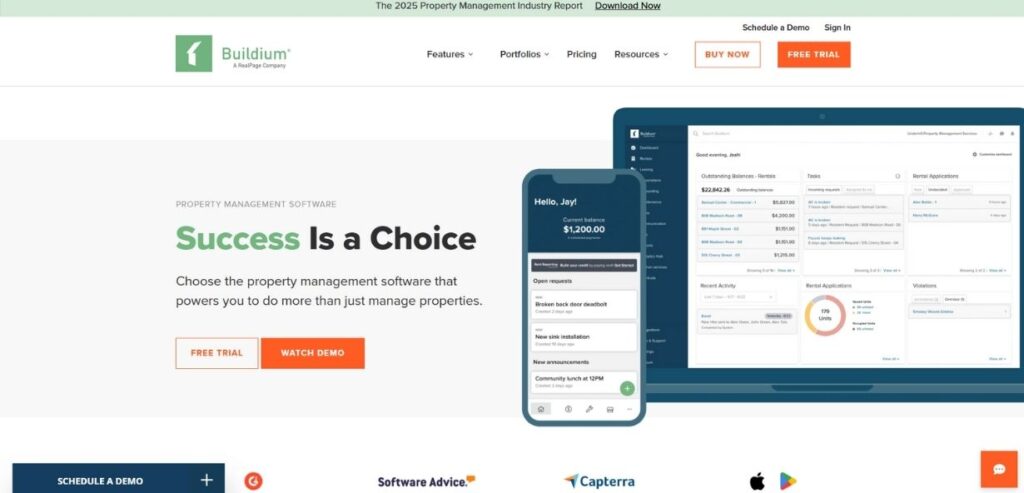
Buildium functions as a cloud-based program that helps landlords and property managers organize their daily property management responsibilities. Through its unified system the software enables property owners to manage tenant data alongside rent payments along with accounting processes. The ERP software platform encompasses maintenance request management together with automated late fees along with a resident portal which enhances communication capabilities. Buildium demonstrates exceptional scalability which caters best to property management businesses between small and mid-sized companies who need operation optimization.
Key Features:
- Tenant and lease tracking
- Online rent collection
- Accounting and financial reporting
- Maintenance request management
- Resident and board member portals
Best Use:
Ideal for property managers and landlords handling residential and commercial rental properties.
Integration:
This platform connects with both QuickBooks and popular applications such as Zillow and Apartments.com, and other third-party programs.
Pricing: Property management pricing from Wednesday Apartment starts at $52 per mont,h depending on the total number of units under management.
Website: www.buildium.com
7. AppFolio Property Manager
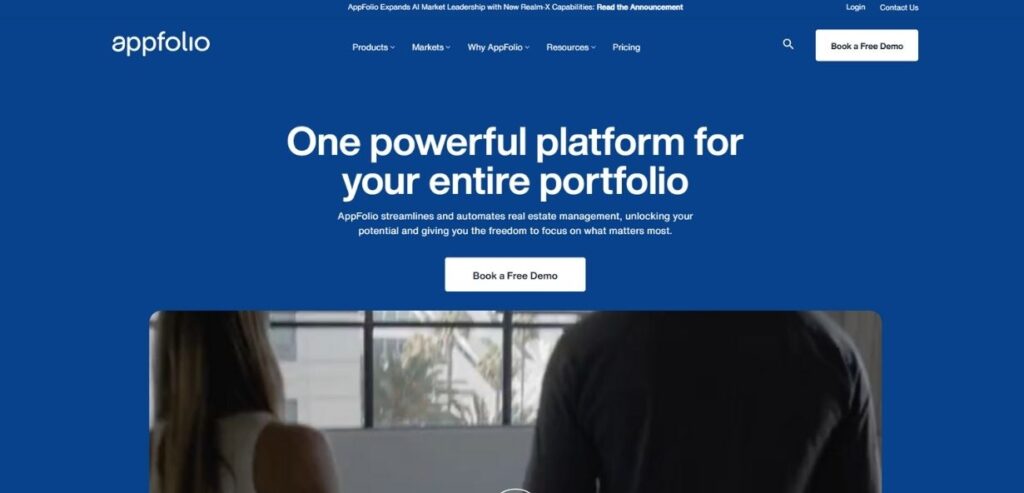
The Ethereum-based AI-powered software AppFolio Property Manager operates to manage rental property operations with a focus on real estate ERP management, and it operates through the Ethereum network. The software includes automatic leasing capabilities that integrate mobile payment products with mobile maintenance tools to advance property management functions.
Artificial intelligence within the leasing assistant utility decreases the lead-to-lease process duration to decrease vacant unit numbers. One of AppFolio’s fundamental features enables property managers to work effectively through combined financial clarity and operational efficiency.
Key Features:
- AI-powered leasing assistant
- Automated rent collection and billing software
- Online maintenance request tracking
- Accounting and financial management
- Mobile access for property managers and tenants
Best Use:
AppFolio offers its best value to multi-family properties together with residential properties and commercial buildings.
Integration:
The system permits property management companies to link their lease listings by integrating with various payment processors together with multiple accounts software.
Pricing: Starts at $1.40 per unit per month, with a minimum monthly fee of $280.
Website: www.appfolio.com
8. RealPage
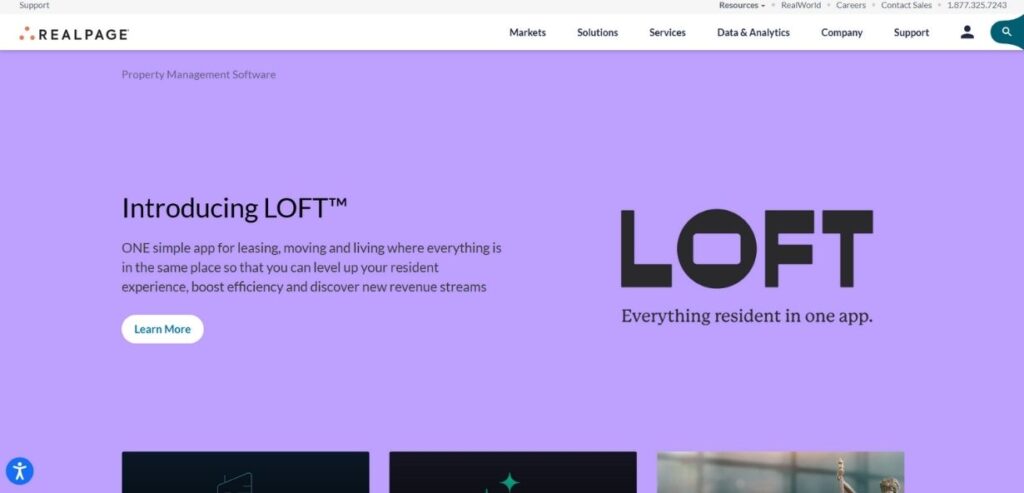
RealPage operates as a robust ERP platform that handles complicated requirements of extensive real estate properties. RealPage enables financial budgeting tools and market data analysis software that assists property owners in making evidence-based management decisions.
RealPage delivers automated rent collection features alongside tenant screening tools to users while also providing their users with risk management capabilities for effective property administration. The sophisticated analytics help RealPage boost asset performance and the company lowers operational risks using AI-based automation systems.
Key Features:
- Financial planning and budgeting
- Compliance tracking and reporting
- AI-powered market insights
- Risk management and tenant screening
- Automated leasing and rent collection
Best Use:
Best for large-scale property management companies and real estate investors handling extensive portfolios.
Integration:
Supports integration with various accounting, payment, and tenant screening systems.
Pricing: The company sets its prices following corporate business demands as well as portfolio requirements.
Website: www.realpage.com
9. Odoo Real Estate ERP
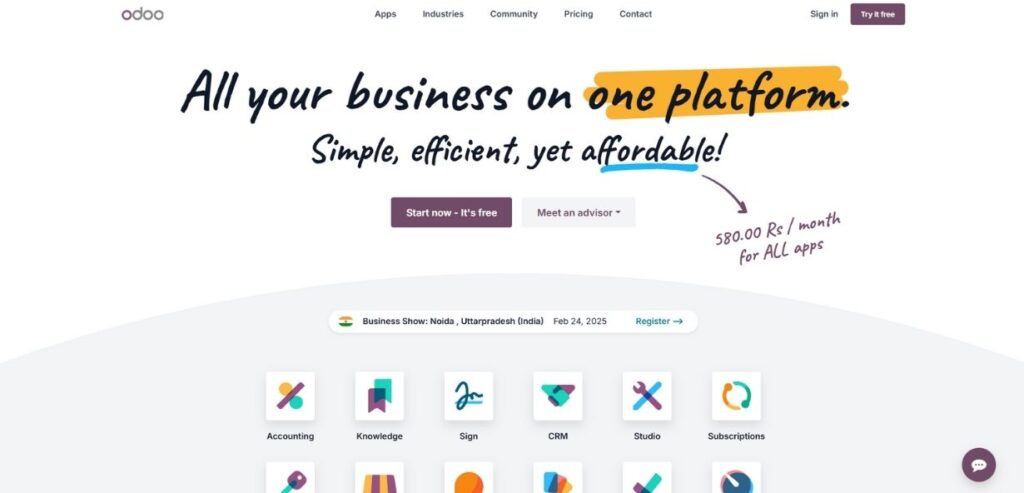
Implementation of Odoo Real Estate ERP enables businesses to build open-source software that supports property sales management alongside lease trackable activities and customer relationship management. The adaptable system enables users to handle real estate transactions with efficiency although it adjusts to multiple business requirements. The cloud system of Odoo gives instant access to members of the team while providing collaborative features.
Key Features:
- The system lets users customize its modules to manage both sales operations and leasing functionalities.
- CRM for managing tenant and client relationships
- Automated workflows and task tracking
- Financial reporting and invoicing
- Cloud-based accessibility
Best Use:
Organizations seeking an inexpensive comprehensive real estate ERP solution that can be customized according to their requirements should consider this system.
Integration:
This platform links with both Odoo’s standard business application suite and external accounting and marketing platforms.
Pricing: Starts at $24.90 per user per month, with fre,e open-source options available.
Website: www.odoo.com
10. ResMan
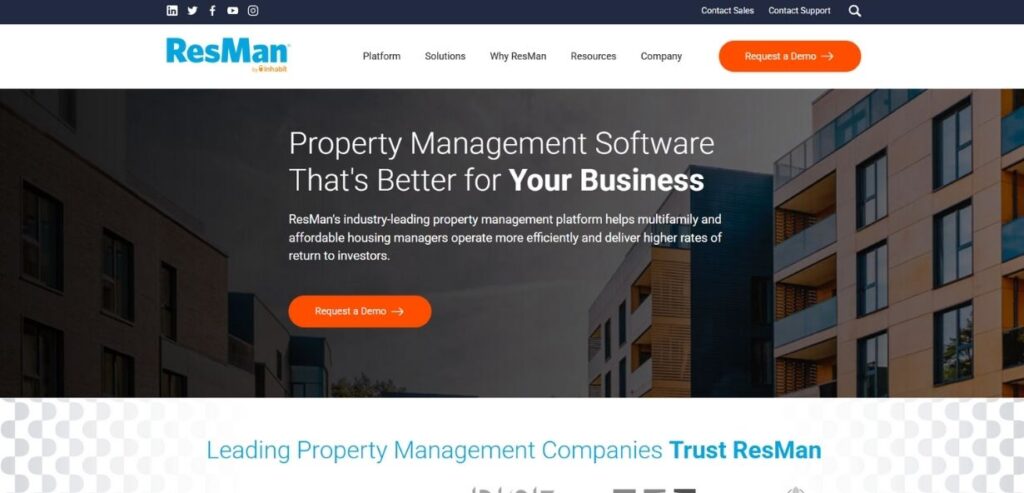
Multi-family property management operations achieve suitable solutions by using ERP platform ResMan. ResMan provides three essential features to enhance property management which includes automated workflow control and lease tracking together with financial management capabilities for operational performance improvement. The basic interface of ResMan enables automatic compliance tracking tools which simplify both tenant management and regulatory tracking processes.
Key Features:
- Automated lease tracking and renewals
- Workflow automation for task management
- Tenant communication portal
- Financial reporting and budgeting tools
- Compliance and risk management
Best Use:
ResMan operates as a system designed for organizations that supervise multiple residential properties and apartment complexes.
Integration:
Through the system users can establish interconnections between accounting modules with payment systems as well as marketing software solutions.
Pricing: The company implements price changes based on user business characteristics together with their specific requirements.
Website: www.myresman.com
11. Zoho Creator Real Estate ERP
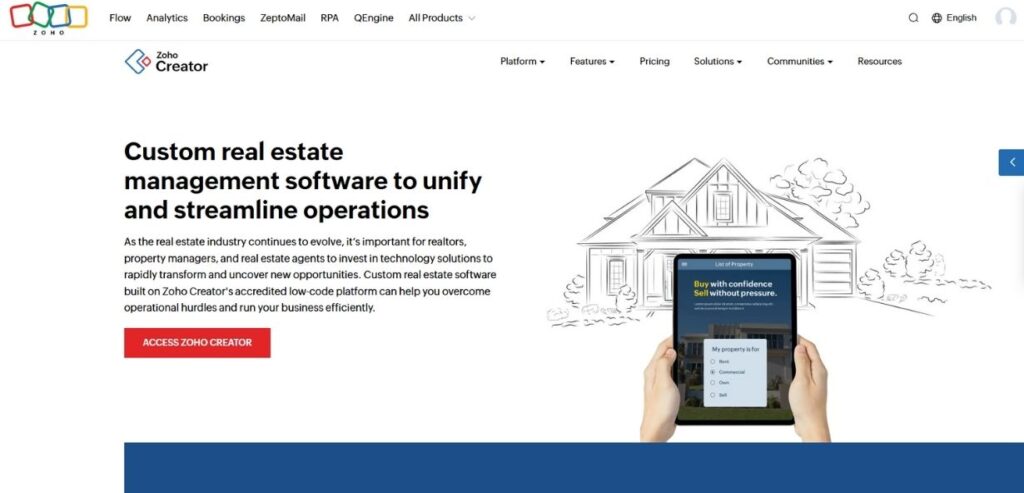
Zoho Creator Real Estate ERP provides businesses with a low-code customizable platform that allows them to develop customized property management systems through their own efforts. Users can design specific workflows through this platform to automate processes regarding leasing and rent collections.
Key Features:
- Low-code customization for unique business needs
- Automated lease and rent collection
- CRM and tenant management
- Financial reporting and invoice tracking
- Mobile access for remote property management
Best Use:
Small to medium-sized businesses would find Zoho best because it provides flexible ERP capabilities that adapt to their individual needs.
Integration:
This system performs smooth integration with Zoho applications as well as third-party business tools.
Pricing: Starts at $10 per user per month.
Website: www.zoho.com/creator/industries/real-estate-development-management-software.html
12. IBM TRIRIGA
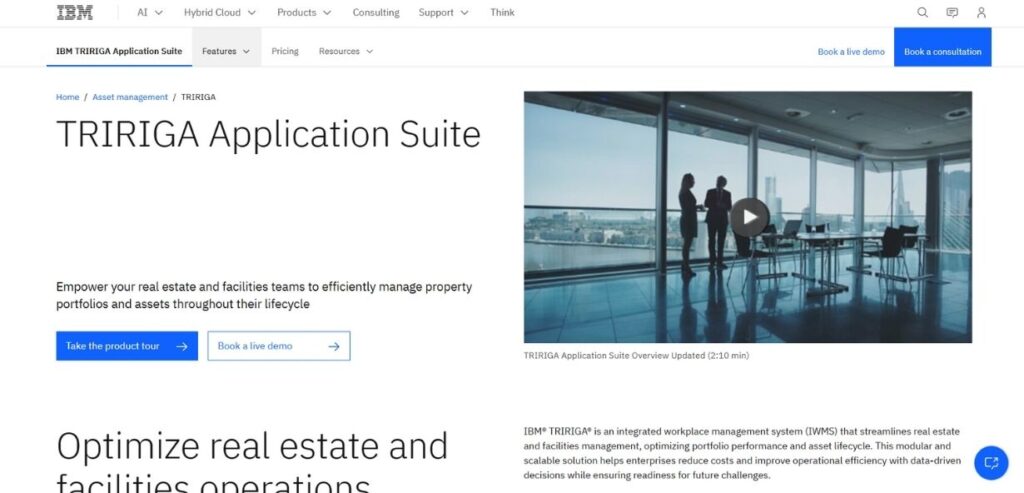
IBM TRIRIGA provides sophisticated real estate ERP services through its functions of lease administration together with energy tracking capabilities along with real estate portfolio optimization features. IBM TRIRIGA delivers efficient management of business real estate assets alongside improved sustainability performance and operational efficiency. IBM TRIRIGA operates through AI analytics and space planning tools that both optimize business decisions and maximize cost savings.
Key Features:
- Lease administration and compliance tracking
- Energy and sustainability tracking
- AI-driven space planning and utilization
- Portfolio management and financial reporting
- Predictive analytics for risk management
Best Use:
Large businesses that control corporate real estate and facilities operations should use this product system.
Integration:
Supports integration with IBM Watson, SAP, Oracle, and other enterprise applications.
Pricing: The company applies tailored pricing models to match the business requirements of individual clients.
Website: www.ibm.com/products/tririga
13. Procore
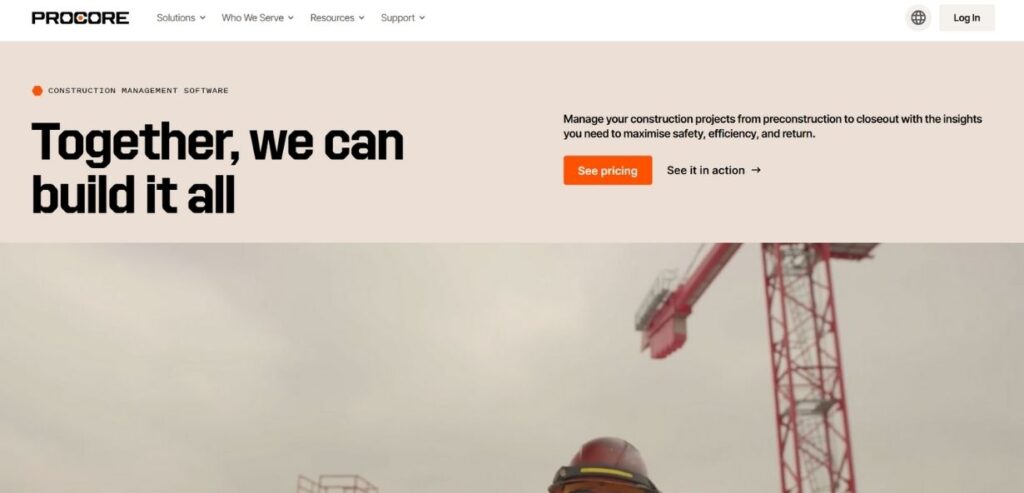
The Procore ERP system delivers its platform through the cloud to meet the exclusive needs of construction and development organizations. Real estate development operations experience increased efficiency because project tracking systems together with financial planning tools and contract management tools, function on one integrated platform. The platform ensures time-based communication platforms that link all stakeholders for better project communicatio,n leading to delay avoidance and budget maintenance.
Key Features:
- Construction project tracking
- Contract and document management
- Budgeting and financial planning
- Collaboration tools for teams and contractors
- Mobile app for on-site project management
Best Use:
The platform offers perfect functionality to construction companies yet simultaneously provides full-scale features to developers executing extended property development operations.
Integration:
The system connects accounting software with CRM and project management tools that support QuickBooks, Sage and Microsoft Dynamics.
Pricing: The solution prices require adaptation based on the project scale and firm dimensions.
Website: www.procore.com
14. Archibus
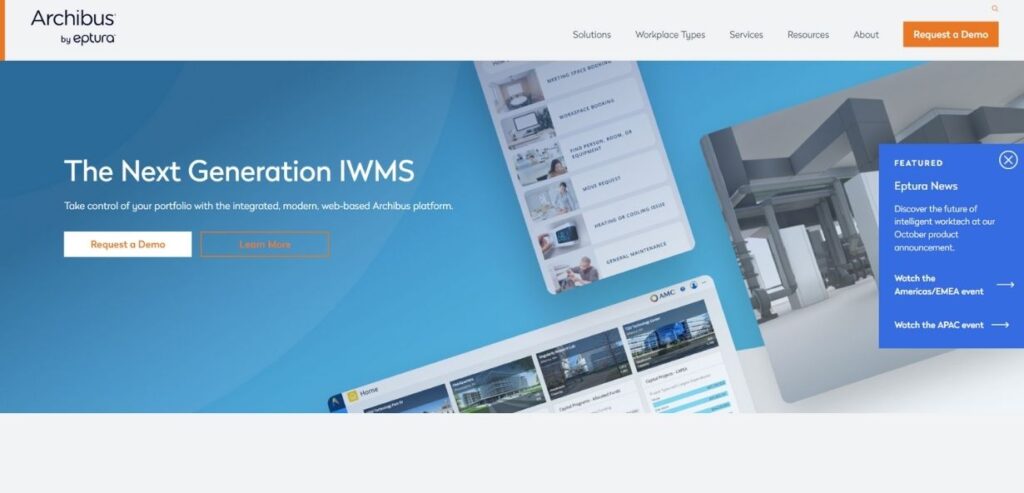
Real estate organizations utilize Archibus to manage estates and facilities because it helps them optimize space planning operations alongside asset tracking and sustainability reporting capabilities. The central management system provides businesses with capabilities to oversee lease administration operations alongside the management of facilities operations as well as energy usage tracking within a single platform. The AI analytics system Archibus enables businesses to maximize their real estate assets and perform sustainability tasks.
Key Features:
- Space and asset management
- Lease and maintenance tracking
- Energy and sustainability reporting
- Real-time portfolio analytics
- Workflow automation for facilities management
Best Use:
Archibus should be the preferred choice for both facility teams and enterprise organizations that need to measure space utilization alongside sustainability performance monitoring.
Integration:
Works with ERP systems like SAP, Oracle, and Microsoft Dynamics, as well as IoT and BIM solutions.
Pricing: Price development at the company happens based on organization-specific specifications.
Website: www.archibus.com
15. BHOOMI Real Estate ERP
BHOOMI Real Estate ERP represents a customized software program designed to serve requirements of the Indian real estate industry. This software solution combines project planning with legal documentation and compliance management features that fulfill the regulations of the Indian real estate sector. Users can automate property sales procedures and handle customer relations and financial planning through the platform which optimizes real estate business activities.
Key Features:
- Project planning and management
- Legal documentation and compliance tracking
- CRM for property sales and customer management
- Financial planning and accounting
- Automated workflow and reporting
Best Use:
This solution serves as a perfect fit for development entities and building companies as well as property management organizations in India.
Integration:
The system connects to accounting modules in combination with CRM and compliance management platforms.
Pricing:Each organisation obtains specific pricing according to its needs.
Website: www.bhoomierp.com
Conclusion
Real Estate ERP software selection requires organizations to make critical choices because it delivers operational excellence together with enhanced financial controls and improved tenant relationships. The installation of strategic ERP frameworks produces various benefits that reduce manual work, enhance standard compliance and deliver immediate property intelligence together with market information. Large enterprises benefit from using SAP S/4HANA with Microsoft Dynamics 365 to obtain complete solutions that handle leases, produce financial reports, and deliver analytical functionality.
Buildium Odoo and Zoho Creator provide suitable ERP solutions for mid-sized real estate companies that grow alongside their business expansion. The selection of ERP systems is based on three fundamental aspects, including operational complexity combined with organizational size as well as financial limitations. Real estate organizations that choose suitable ERP systems will reach operational excellence and improved business choices alongside extended financial advantages.
FAQs
1. What is the best ERP software for real estate businesses?
Real estate businesses must make a selection between ERP software solutions that will provide maximum value for operational needs. Real estate businesses should pick between SAP S/4HANA, Oracle NetSuite and Yardi Voyager based on their organizational size.
2. What particular features enable an ERP system to improve real estate management functions?
This software benefits real estate firms because it unites property management features with financial operations and CRM capabilities, and lease tracking capabilities to eliminate manual work and support better strategic choices.
3. Can small real estate firms use ERP software?
ERP software systems remain accessible to companies operating in small real estate sectors. Real estate companies, small to midsize, can use ERP solutions from Buildium Odoo Real Estate and SAP Business One.
4. Is cloud-based ERP better than on-premise solutions?
Cloud-based ERP systems deliver superior value than standard on-premise ERP deployments. Modern businesses should choose cloud-based ERPs because they provide better accessibility combined with lower costs and automatic software updates.
5. How much does real estate ERP software system expenditure amount to?
The price of a real estate ERP software solution depends on user numbers and business size alongside the selected feature set. Users have the choice to select free Odoo versions among their open-source selection of options yet enterprise software can reach thousands annually.

